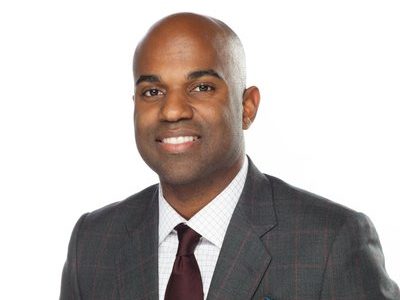
From the end zone to luxury open houses, Terrence Murphy is proof that an entrepreneurial spirit is the key to success in nearly everything.
Murphy is not only a legendary football player, he is also a top-producing real estate agent, investor and broker-owner. He leads TM5 Properties, powered by eXp Realty, which has won the Inc. 5000 several times. He even hosts a podcast, despite describing himself as an introvert.
Despite the tight market, Murphy has amassed more than 75 listings above $1 million. Below, he spoke with HousingWire about his career in real estate and as a professional football player. Throughout it all, Murphy said, “Books, God and my wife are my triangle of success.”
HousingWire: Before we discuss your current career in real estate, tell us a bit more about your past experience as an athlete.
Terrence Murphy: I was a quarterback out of East Texas, and I had 20 Division One offers to play quarterback. I had a lot of really good offers because of my GPA scores and my background, so I actually got full-ride academic offers before I ever got a full athletic scholarship.
I chose to go to Texas A&M and played football as a two-time team captain; a two-time, first-team all-conference; and two All-American records. I also broke several school records. I’m most proud of my three-time, academic all-conference record. It was really important to me, and my mom, to not just go to school to score touchdowns but to do really well in the classroom as well.
Back then, a lot of freshmen got red-shirted. I actually came in on the first game of the year, and as a true freshman, caught the game-winning touchdown in the fourth quarter with two minutes left. To come from humble beginnings — I wasn’t a big-time recruit — and catch that game-winning touchdown, really set my career on the right path.
My next step was getting drafted. I was projected to go in the top 15 as a receiver. Aaron Rodgers was the first pick for Green Bay that year and I was the second pick. In that same season, I got injured. Today, everyone knows Damar Hamlin’s name because of his cardiac arrest. A very similar thing happened to me on Monday Night Football. It forced me to retire because I had neck injuries.
HW: How did you make the transition to real estate? What inspired that move?
TM: I had to rebuild myself mentally, spiritually and physically. I was in a transition, thinking, “What am I going to do with my life?”
I ended up doubling down on my financial literacy. When the stock market hit in 2008, I went to my financial advisor and told him to take out all my money. He challenged me and said, “What are you going to do?” So, I went to Barnes and Noble, and I started buying real estate books, investment books and financial books. I read Robert Kiyosaki’s book, “Who Took My Money?” That is what set me on my real estate path. That book changed my life.
As I fully transitioned into real estate, I started investing with a group called Stillwater Capital in Dallas. They gave me my first taste of real estate investing. After three years of investing with them, I told my wife I wanted to move back to College Station and start doing real estate there. I was still reading books and teaching myself how to become a real estate investor and entrepreneur. So, I started buying houses around campus.
I tried to get mentors, and I would knock on people’s doors, but no one ever had time for me, which was the total opposite of what I expected. I thought, “Man, I was the face of Texas A&M football and an NFL draft pick,” but the world thinks we just had stuff laid out for us and it wasn’t. So, I had to build everything on my own.
HW: What was the greatest learning curve getting into a new industry?
TM: I taught myself through trial and error. That is where I cut my teeth. After doing that for a couple of years, people started to ask me to help them learn the business. I ended up getting my license with Keller Williams. In that first year, I did seven transactions for $1 million, and I was frustrated because I knew I could do better than that. I left after only doing seven transactions, and I started my own brokerage. Everyone told me not to do that, but that’s part of being an athlete; you just blaze out there.
I started TM5 with no broker help, no training or anything. Since then, I’ve scaled the business with my team to $1.4 billion in sales in eight years. Now, I have 52 companies under the Terrence Murphy company portfolio. They are either companies that I founded and created or ones that I acquired. But back then, I started winning awards like Inc. 5000, and realized that I knew something about being an entrepreneur. That was when we started scaling and doing everything that we are doing.
HW: Having more than 50 businesses under your portfolio is impressive. Obviously, partnerships and strong business relationships have played a big role in your ability to scale that way. How do you think you’ve best-used partnerships to grow your business?
TM: I didn’t have a specific mentor, so God has truly been my mentor. I just figured most of this out on my own. My wife has played such an interesting role. She’s been my business partner and she is very sharp. She helps me execute my visions and integrate them. She’s my right hand in building these companies. We funded everything on our own and we sacrificed. I remember that I ate sack lunches for a year straight. All the money I could have spent going out for lunch, I spent on books.
Other than that, it is all about hiring the right people. You need people that can get behind a vision. I can cast a vision and create a picture for people; that is a gift of mine. But having a team that can help me execute is key.
God, those books and my wife have been the triangle to success.
HW: What does the market look like in your area?
TM: Texas is a very unique place with the interest rates being at an all-time high. It is stable but unique. There are four major housing markets: Houston, Austin, Dallas and San Antonio. College Station is right in the center of them all.
Just last week, I closed another $3 million listing. I’ve done about 75 listings in the range of $1 million to $7 million. High-end homes and luxury ranches are my specialty. Those stats are just me personally, not my brokerage or team.
It goes to show that no matter what the interest rates are, high-net-worth individuals are buying luxury real estate. And they mostly pay cash for these properties.
I didn’t start there but, obviously, that’s what I’ve worked my way up to as a broker.
HW: What lessons from your football career helped you in the real estate business?
TM: One of the biggest similarities is the importance of team culture. If you get one bad apple in the bunch who is negative, makes excuses and doesn’t work hard, then they can corrupt the whole team. Now, I get why coaches used to make guys run. I get why coaches used to bench people or cut players because they can really hurt the whole team environment. I recognized that similarity quickly.
One of the hardest things I’ve realized is that to scale a business, you need people. I can sell a lot of high-end ranches by myself, but I can’t get to everybody. So who on my team can create a similar experience as me? I studied the Starbucks business model and learned a lot about how they run their business.
Back when I was in high school, I had an underdog story. In my sophomore year, my high school record was 0-10. Junior year it was 1-9.
Going into my senior year, our school hadn’t signed a Division One recruit in 10 years, but I was walking around telling everybody that I was going to be one of them, that I was going to play in the NFL. People thought I was delusional. That is the reason I worked so hard to take the opportunities that were put in front of me.





